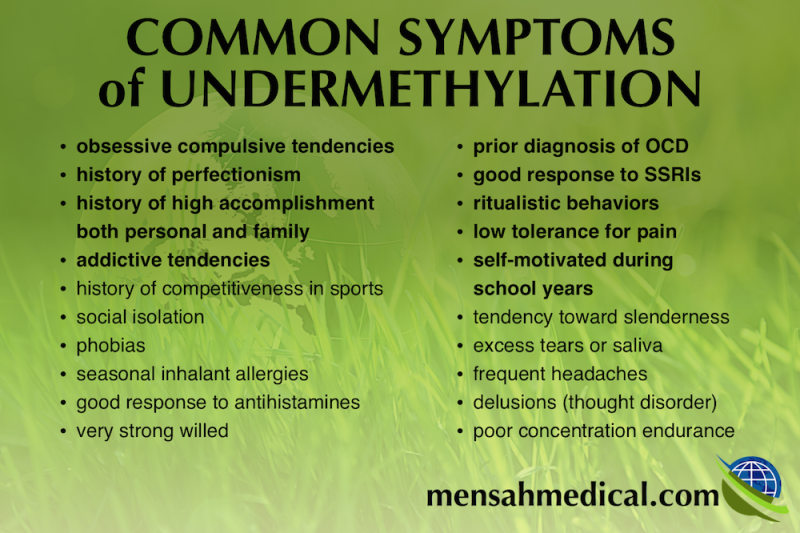Common symptoms of undermethylation are a history of high accomplishment, perfectionism, obsessive compulsive tendencies, and ritualistic behaviors. Most people with symptoms of undermethylation are highly motivated and have addictive personalities. Patients who have been diagnosed with OCD are likely undermethylated. Undermethylation occurs when too few methyl molecules are available to add to enzymes, hormones, and neurotransmitters as well as to DNA itself. This influences physiological and psychiatric issues such as mood, memory, concentration, and sleep.
Undermethylated patients have a genetic tendency to be very depressed in calcium, magnesium, methionine, and Vitamin B-6, with excessive levels of folic acid. Undermethylated patients may benefit nicely from Paxil, Zoloft, and other serotonin-enhancing medications, although nasty side effects are common. A more natural approach is to directly correct the underlying problem using methionine, calcium, magnesium, and other vital nutrients designed to treat their undermethylation disorder.

Undermethylation is formally referred to as histadelia. This condition has too few methyl groups (a carbon group with three hydrogen atoms) which help regulate neurotransmitter activity. This can lead to perfectionism, high accomplishment, and high achievement (overdrive). About 15-20% of these people experience difficulties as a result of their undermethylation.
Common Symptoms of Undermethylation
You may be undermethylated if you are known to be a perfectionist and are highly competitive. Many undermethylated persons in the general population tend to be high-achievers and have good mental health. These people tend to be our doctors, lawyers, educators, secretaries, corporate executives, professional athletes and scientists who strive for high career accomplishment. Common to each of these is the perfectionist tendency prompted by undermethylation.
Many individuals diagnosed with mental illnesses have severe undermethylation which is associated with dangerously low serotonin activity. Albert Mensah, MD and Judith Bowman, MD, leaders in the use of targeted advanced nutrient therapy in the treatment of biochemical imbalances treat undermethylated persons with anxiety, depression, schizophrenia, ADHD, autism, Alzheimer’s disease, Aspergers syndrome, OCD, as well as other conditions.
Are you and/or your Spouse Undermethylated and Planning on Starting a Family?
Call Mensah Medical to evaluate the epigenetic potentials for you and your family. It is important to understand that undermethylated parents are more vulnerable to epigenetic insults that can cause ADHD, anxiety, depression, autism, as well as many others. If you suspect a methylation disorder, seek testing and biochemical evaluation at Mensah Medical to uncover your biochemical potential.
To learn more about undermethylation, Watch a video description by William Walsh, PhD, President of the Walsh Research Institute:
